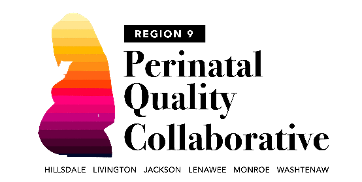
Building a Diverse Doula Workforce in Southeast Michigan
Press Release – July 5, 2022
The Region 9 Perinatal Quality Collaborative (PQC) received grant funding from the Michigan Health Endowment Fund to expand the Doula workforce to include more diverse representation to promote accessible, welcoming, culturally, and racially aligned labor support to address health disparities and improve birth outcomes.
The Region 9 PQC will receive $34,000 from the Michigan Health Endowment Fund’s Community Health Impact grant to support this project work in alignment with their focus on maternal and infant health and health equity. Lisa Kane Low, a Region 9 Co-Chair and project lead, shares, “In our community outreach work, we heard more and more families asking for access to Doula services, so we are thrilled to have this grant funding to move forward in response to the Region 9 community desires.”
Doulas are trained, paraprofessionals who provide education, physical comfort, and emotional support during the perinatal period. The continuous non-medical, social and emotional support offered by Doulas has been demonstrated to increase the birthing person’s satisfaction with their birthing experience and profoundly impact key clinical outcomes, including decreased caesarean birth rates, fewer medical interventions, shorter duration of labor, and increased breastfeeding initiation and duration.
This funding supports three key components: 1) education targeting both obstetric care providers and birthing women and people, 2) financially sponsoring a diverse cohort of individuals to be trained and certified as Doulas, and 3) developing a mentorship program between existing Doulas and the new cohort. We believe this approach will strengthen the current Doula workforce and ensure that birthing families receive culturally and racially aligned labor support.
Significantly, Doulas are trained to understand the impact of the social determinants of health and advocate for birthing individuals within the healthcare systems with internalized biases and institutionalized racism, a driving force in maternal and infant morbidity and mortality. Melisa Scott, the project workgroup’s lead, explains, “As a midwife, I have seen the powerful and often lifesaving impact of the care provided by Doulas. There are many fantastic Doulas but very few Doulas of color. Many families request Doulas from their culture and community.”
This project, designed in partnership with community members and Doulas, aims to eliminate common barriers to becoming a full-time Doula and achieve a diverse, community-based workforce. Najma Treadwell, a Trusted Parent Advisor, and Community Leader, shares her excitement about the project:
“I am looking forward to being a trained Doula for my county. This opportunity will allow those [who don’t know all care options available] the chance to experience all that a Doula can offer during their birthing experience.”
As Scott says, “We can’t change this system overnight, but we can make some important movement towards change that centers the families who can’t afford to wait.” We invite all interested parties in Livingston, Jackson, Washtenaw, Hillsdale, Lenawee, and Monroe counties to join us in this work.

– The Region 9 Perinatal Quality Collaborative is a state-funded initiative working to improve perinatal health outcomes in Southeast Michigan.
Learn more at Region9.org.
For questions or inquiries, contact: Helen Joa, helenjoa@umich.edu.




